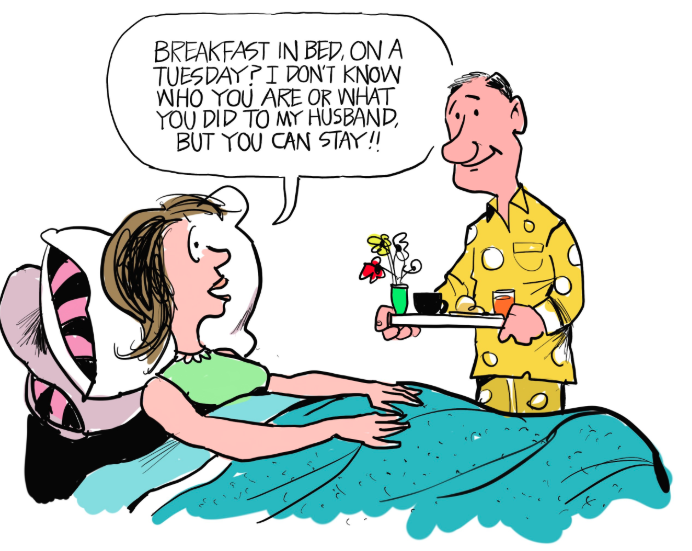Companionship and love are wonderful things, but they require care and attention.
Like flowers in a garden, if you ignore them, they’ll wither and die.
How are you doing with your flowers? Are you paying regular attention to your garden?
According to the American Psychological Association, about 40–50 percent of married couples in the United States divorce. It’s even higher for second marriages.
Stress, financial strain, infidelity, addictions, and personal changes are all factors that can lead to divorce. Yet, despite these challenges, research shows that married couples tend to be happier, healthier, and wealthier than their unhitched friends.
If you want things to bloom and thrive in your relationship, here are a few suggestions:
Invest in the emotional bank account.
Relationships are a lot like banking. If you keep taking out withdrawals, your bank account will dwindle and soon you’ll be broke. So it is with a relationship. If all you do is take and never give, you’ll deplete your partner’s “emotional bank account.”
The solution is to make regular deposits. Random and unexpected acts of kindness and love.
Bring her flowers. Not on her birthday or Valentine’s day. Do it on a Tuesday, when she gets home from work. Just because you love her.
Surprise him when he gets home by taking him to his favorite sports pub. Then hit the movies, where you bought tickets to the latest superhero movie (even though you hate superhero movies).
I talk about this idea, and more broadly about the “bank account of human dignity” in another blog post. The point is, it can’t just be about you in a relationship. You need to make deposits in that emotional bank account. Because sooner or later, you’ll anger or disappoint your partner, and it’s good to have investments to soften the blow.
Who holds the most power?
Healthy and strong relationships are a partnership. Each person brings positive qualities and contributions to the relationship. Unfortunately, some relationships can become lopsided. One person ends up driving the relationship more than the other.
The late Dr. Gordon Livingston was a psychiatrist and author of several books, including the excellent, Too Soon Old, Too Late Smart: Thirty True Things You Need to Know Now. Chapter five of Too Soon Old, Too Late Smart is: “Any relationship is under control of the person who cares the least.”
I have witnessed this reality in my 26-year police career, responding to domestic violence calls.
When one person gives up on a relationship, it’s nearly impossible for the other person to turn things around. The one who cares the least has all the power.
How do couples keep this from happening?
I need to talk with you.
You know how sometimes you can tell that she’s mad at you, but you’re not sure why? She’s just a tad distant and snippy.
So what do you do? You play this game of tit for tat. You give her a bit of the silent treatment. Or perhaps you do something that will annoy her. How stupid is that? Why not walk right up to her and say, “Hey, what’s wrong?” Communication is the cornerstone of a healthy relationship.
For some reason, our emotions get the best of us and we avoid honest and direct conversation. Maybe we’re worried that asking tough questions will invite an argument. But in reality, letting things fester is far worse.
Little, unattended resentments grow over time, like a spreading cancer. Before long, the relationship is in stage four trouble. The only solution is preventative medicine. And that means having the courage to speak up at the first sign of trouble.
Like it or not, adversity is part of all relationships. Disagreements and challenges will intrude, sooner or later, in each of our relationships.
“You don’t develop courage by being happy in your relationships every day. You develop it by surviving difficult times and challenging adversity.” ~ Epicurus
Happiness in our relationships is not a constant state of being. It comes and goes. Perhaps that’s what makes happiness so wonderful. If we felt it all the time, it wouldn’t be as special.
So, for the times when adversity strikes, have the courage to face it. Don’t be afraid or procrastinate when it comes to difficult conversations. The sooner you address the issues, the faster you can fix them.

The gift of validation.
A lot of guys are terrible at this one. We tend to approach problems with logic instead of our hearts. When our partners are pouring out feelings and emotional struggles, they don’t want logical solutions.
All they want is our empathy. Our understanding. Our nonjudgmental listening, hugs and, “Poor baby, I can see why you feel that way.”
Why is it so hard for us to simply acknowledge what another is feeling? Why must we always try to fix everything?
The gift of validation is that you recognize and acknowledge what your partner is feeling. Even if you think they are wrong to feel the way they do, it’s not your emotion to comment on. It belongs to them.
Give the gift of validation. Let him or her take the time to talk about how they feel, without solutions or judgment from you. By doing so, they’ll trust you more. Later on, they’ll be more open to your suggestions and solutions.
Stop trying to change your partner.
Your spouse is not you, so why do you keep trying to make him/her act like you? We are all individuals, with our own tastes, likes, habits, and orientations.
When we fall in love, we are enamored with the uniqueness of our partner. If we were identical, that would be boring. But for some reason, as relationships march on and the novelty of newness wanes, we change. We stop admiring the uniqueness of our partner and demand compliance with our way of doing things.
This is crazy. By adulthood, people are largely formed. Yes, they can adopt new habits and improve themselves, but the motivation for this must come from within.
Nagging and negative pressure rarely work for the long haul. You may gain temporary compliance, but it can breed resentment. Positive reinforcement and coming from a loving place is more desirable. Gentle encouragement and honest, open communication go much further than hectoring and nagging.
Yes, sometimes relationships confront a crisis. Maybe his drinking has gotten out of hand, and you have to lay everything on the line. “Get help,” you’ll tell him, or you’re gone.
Sometimes an ultimatum can work, if it comes from a loving and honest place. “I love you, darling, but I can’t tolerate your drug addiction anymore. Let’s get you help. Otherwise, it’s unhealthy for me to continue this way.” That’s an honest, loving statement. It’s more likely to work than endless nagging and yelling.
Of course, in the end, we must always take care of ourselves. If the relationship turns abusive, or our partner is lost in addiction, it’s unhealthy for us to endure such challenges. Sometimes our exit can force our partner to face the truth of his/her problem. Sometimes not, but at least we protect ourselves from a dysfunctional, destructive relationship.
However, for the day-to-day struggles of relationships, we must stop trying to change our partners. His musical tastes are different than yours. Your favorite sport is different than his. He likes a firm bed; you like a soft one. So what? Variety is the spice of life.
Still, if something your partner does really bugs you, what do you do?
Embrace the power of compromise.
So many disagreements in life can be ameliorated with compromise. Yet, for some reason, we have such a hard time doing it.
Perhaps it stems back to childhood when we are more fragile and selfish? Some people seem to endlessly battle everything. Their bosses, the morning traffic, salespersons. Everywhere they turn, they have a complaint. They feel put upon and wronged.
Such people lack resilience and view everyone and everything around them as wrong. They never stop to consider that maybe, the problem lies with them. They are blind to the fact that they are too demanding, unforgiving, and incapable of compromise. And so they go through life miserable. What a terrible way to live. The reality is that none of us get our way all the time. That’s just part of life. However, through open and fair negotiation, we can reach compromises.
“I simply do not think that yelling, swearing, threatening or belittling will get you to the place you want to be faster than kindness, understanding, patience and a little willingness to compromise.” ~ Rachel Nichols
The beauty of compromise is that we all can get a portion of what we want. That’s called a win-win, and it’s the only sane way to navigate life. And especially your relationship.
If you want to avoid divorce and keep those embers of love glowing, learn to embrace compromise.

Don’t hold on too tight.
Freedom to be ourselves is an important thing. Each of us develops our own styles, interests, likes, and way of being. Nothing is more stifling than to be in a relationship with someone who denies us our individuality.
Insecure people have a hard time with uncertainty. They feel the need to control everything, including their partners. They hold on too tight.
This is unfortunate, because no one likes being controlled by another. Healthy relationships must allow for one another’s individuality. Two people should complement one another, not control one another.
Possessiveness is yet another manifestation of insecurity. We can never “own” or “control” another person, nor should we try to. We should simply love and respect them.
“Relationships—of all kinds—are like sand held in your hand. Held loosely, with an open hand, the sand remains where it is. The minute you close your hand and squeeze tightly to hold on, the sand trickles through your fingers. You may hold onto some of it, but most will be spilled. A relationship is like that. Held loosely, with respect and freedom for the other person, it is likely to remain intact. But hold too tightly, too possessively, and the relationship slips away and is lost.” ~ Kaleel Jamison
Forgiveness.
We all have some grievances in life to which we are entitled. The question is, what do we do with them?
Some people are endless scorekeepers, always blaming people and institutions for all their woes. As Dr. Gordon Livingston wrote:
“We live in a culture in which the sense of being wronged is pervasive. If every misfortune can be blamed on someone else, we are relieved of the difficult task of examining our own contributory behavior or just accepting the reality that life is and has been full of adversity.”
Once we accept that people (including ourselves) are not perfect, we can learn the power of forgiveness. The ability to let go of the hurt, anger, and pain frees us. As Dr. Gordon Livingston notes:
“Widely confused with forgetting or reconciliation, forgiveness is neither. It is not something we do for others; it is a gift to ourselves. It exists, as does all true healing, at the intersection of love and justice.”
Learn to forgive others, especially your spouse. Most importantly, learn to forgive yourself. Doing so will help insulate you against divorce, and the unhealthy effects on buried anger.
Sometimes you can do everything right, and your spouse chooses to end the relationship anyway. As with so many things in life, control is illusory. Nevertheless, the joys of a healthy, loving relationship are many.
Invest in that emotional bank account, share equal power, communicate, validate, stop nagging, compromise, don’t hold on too tight, and most importantly, forgive.
Do these things, and you stand a good chance of enjoying a lifelong, fulfilling, and loving marriage. Best of luck!
~


 Share on bsky
Share on bsky





Read 8 comments and reply